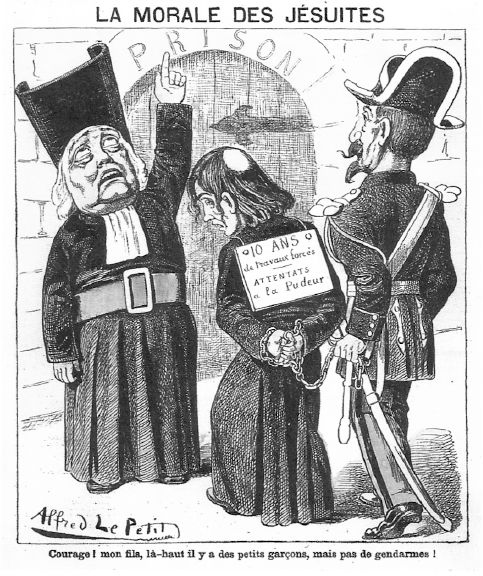|
|||
| THE MORALS OF JESUITS by AW Richard Sipe September 06, 2011 | |||
 A young Jesuit is being
escorted to prison with the sign on his back
"Ten
Years at Forced Labor for crimes against decency."
The old priest is pointing up,
saying
"Courage my son! Above there are little boys, but no policemen."
A young Jesuit is being
escorted to prison with the sign on his back
"Ten
Years at Forced Labor for crimes against decency."
The old priest is pointing up,
saying
"Courage my son! Above there are little boys, but no policemen."
| |||
|
Some priests-Jesuits understandably-and some laymen and women who retain gratitude and good feelings for Jesuit teachers and friends may take umbrage at introducing the subject of sex abuse in the society with an illustration from the 1883 French anticlerical journal LE GRELOT. It is neither unfair nor unwarranted despite the fact that one of the editors of the prestigious journal America even some years ago said that clergy were "tired" of seeing the subject of clergy sex abuse in the media. I agree, news of Catholic clergy sexual abuse may be tiresome, but it remains timely. Certainly abuse within the clerical ranks is not resolved. For all the ugly print and pictures it is still largely a problem unaddressed at its core and foundation-within clerical culture. The 2011 John-Jay Report on the Context and Causes of the crisis of sexual abuse among Catholic clergy was myopic in confining their understanding to the United States culture of the 1960s (the sexual revolution etc). German Jesuits are among the first Jesuit province in the world to acknowledge the problem publicly. In 2010 when eventually 115 former students from exclusive Jesuit schools came forward to allege abuse Fr Stefan Dartmann, S.J. the German Provincial, spoke out. First he talked about students at Canisius College, Berlin who had registered complaints of violations already in 1981. That was decades earlier than the order had previously admitted. He registered shame that the college and the order had left the complaints unanswered. A year later, in 2011, the Society offered victims of Jesuit abuse from Berlin, Hamburg, Bonn, the Black Forest some financial compensation-c. 5,000 Euros each. In 2003 at the invitation of lawyer Ken Roosa I went to Bethel, Alaska to interview four Native Americans who complained about abuse from the pastor of their parish in St. Michael. I must admit that during the mediation I felt chagrin and humiliation by the arrogant way Fr. Ford, S.J. treated the complaints and the victims. He, along with bishop Donald Kettler of Fairbanks, registered disdain and disregard as they offered the victims $10,000 each. Clearly the churchmen saw the offer as gratuitous and generous. I advised the lawyers to dismiss the offer with the conviction that "this is just the tip of the iceberg." The lawyers persevered in their defense of victims and by 2007 57 priests, mostly Jesuits, had been identified as abusers and the Oregon Province of the Society of Jesus compensated 110 victims in native Alaska villages with a settlement of 50 million dollars. By 2009 the Oregon Province that was responsible for Jesuits in Alaska filed for bankruptcy. When the final settlement was made in March 2011, 700 Jesuit victims in Alaska and throughout the Province received a total of about $250 million. The crisis of sex abuse by Catholic clergy, Jesuit or other, is not a problem of the past. It is not historically limited to America as the pope, bishops, and the 2011 John-Jay Report on the situation would have us think. French anticlericalism of the 1880s notwithstanding, abuse of minors persists as an integral part of the clerical cultural system. It endures despite the implorations of Peter Damian (Letter 31) to Pope Leo IX in 1049 CE: "In our region a certain abominable and most shameful vice has developed". He advised prevention and severe punishment to avoid divine fury and "unchecked violence to the destruction of many." He was writing primarily about sexual violation of minors. Has the Roman Catholic priesthood made any progress with celibacy in nearly 1000 years? In the ebb and flow of religious practice, probably not. We may be at a low point now world wide; at least modern communication makes it seem so. In 1993 on a trip to Rome for a Vatican sponsored International meeting on celibacy I visited the Bellarmino, a house of studies for Jesuit graduate students. In a lively discussion about celibacy one of the Jesuit historians said, "Celibacy is not possible." Period. He went on to say that the early Jesuits taught that masturbation was not a grave sin. That caused them to be censured and silenced on the subject at that time by the Vatican. Certainly celibacy and human sexuality are not taught in seminaries. One reason: Sex/celibacy is too dangerous to talk about because not enough bishops, rectors, novice masters, confessors and seminary faculty members are practicing celibacy. Open, honest discussion of human sexuality will expose too much and too many. Sexual abuse of minors is a symptom of the lack of knowledge and development in human sexuality and the understanding and practice of celibacy that prevails in Catholic seminaries and religious houses. Men-even religious men-are not angels. It does little good to advise them to "live like angels" as St. Ignatius counseled. In the 1960s John L. Thomas, S.J. said that priests should know everything there is to know about human sexuality, "short of experience." I have tried to help. The symptoms will persist until Fr. Thomas' example prevails. That will take some discussion and some honest reckoning.
| |||
